
6 Jun, 2017
From a Vietnamese farm to Forbes: The start-up that wowed Subic Ecotourism Fest
Subic Bay, the Philippines – Of the many erudite presentations at the Subic Ecotourism Festival held between 28 May – 2 June, the most inspiring was the story of how a young Vietnamese girl overcame poverty, illiteracy, an alcoholic father and single motherhood to land up on the cover of Forbes Asia magazine as a rising-star millennial. In doing so, Shu Tan, now 31, founder and director of the social enterprise cum tour operator Sapa O’Chau, epitomised all the values and principles advocated by both the ASEAN economic and socio-cultural integration process as well as the UN Sustainable Development Goals.

Shu Tan (aka Tan Thi Su), before and after.
Organised by the International School of Sustainable Tourism (ISST), headed by former Philippines Tourism Secretary Dr Mina Gabor, the Festival was designed to commemorate the International Year of Sustainable Tourism for Development declared by UN World Tourism Organisation. With seven board members of the Global Ecotourism Network (GEN) and Asian Ecotourism Network (AEN) as speakers, a turnout of 335 delegates from all over the Philippines heard some outstanding stories from Africa and Costa Rica, from Japan to Jordan, from Malaysia, Indonesia, Australia and the Philippines, covering topics from architecture to ecotourism site development to media and communication.
The popular turnout included city mayors and vice-mayors, provincial and municipal tourism officers, agricultural and environmental officers, and local government officials who are into environmental sustainability and protection, community development, alternative livelihood and other related projects. It was supported by Philippine Airlines, Department of Tourism, Tourism Promotions Board, Department of Environment and Natural Resources and the Department of Interior and Local Government.
In her welcoming remarks, Mrs Wilma Eisma, Administrator, Subic Bay Metropolitan Authority said this year was the 25th anniversary of the U.S. military’s departure from Subic bay following the volcanic eruption of Mt Pinatubo, an act of God against which the formidable U.S. military didn’t stand a chance. The giant military base was wiped out, leaving 8,000 people jobless. It took two years to clean up the devastation, mostly by unpaid volunteers, including herself, then just a young teenager. Today, she said, the base is being reinvented into a giant economic and tourism entity, with its great beaches and forests pretty much restored to what they were before.
Adding to that, Dr Gabor said, it also marked 15 years since the Philippines was supposed to have held the 2002 World Expo under the theme of Global Ecotourism – Growing with Nature, the first time that ecotourism was chosen as a World Expo theme. The Philippines eventually opted out of hosting the Expo, due to economic difficulties. Nevertheless, said Dr Gabor, the dream has been fulfilled. Exactly 15 years later, “we have gathered here with the best minds in the field of ecotourism. We finally did it.”
It was also a welcome intro for an upcoming event. In addition to chairing ASEAN in its 50th anniversary year, the Philippines will soon host one of the most important conferences in the field of sustainable tourism – a UNWTO event that will, for the first time, set up statistical indicators for measuring the ecological impact of global tourism.
Of the many learned planners, policy-makers and practitioners who spoke on foreign and Filipino best-practises, the most outstanding was by the youngest and least-educated speaker.

In her presentation, Ms Shu (aka Tan Thi Su) said that as a 12-year-old child street seller, her curiosity was aroused by the tourists coming to visit her Lao Chai village, belonging to the Hmong ethnic community. Why did they come? What did they want? Simply by talking to them over the years, her English became good enough to start guiding them herself. In 2007 she developed the concept of Sapa O’Chau with 4 Australian friends, and then grew it into the only not-for-profit tour operator in Sapa. After covering costs, all the tourist income goes to support the community. Tours are the main income, not donations. Her own income helps support her three sisters and her mother. She does not give any money to her father because “he will only take it and drink, drink, drink.”
She only finished high school in 2010 and began attending university in 2011. In an interview, she said she had become a single mother at 19. Her boyfriend fled before her daughter was born as they were denied parental permission to marry. She is now happily married to a Singaporean mathematician whom she met on one of the tours. In 2016, she landed up on the cover of Forbes Vietnam under 30 list. The same year, she helped Sapa O’Chau obtain international accreditation from World Responsible Tourism Awards 2016 (SILVER) and World Tourism for Tomorrow Awards 2016 (Finalist).
The Sapa O’Chau website www.sapaochau.org hails all visitors thus: “You and our high profile international partners are helping to change tourism into a more ethical, responsible and sustainable industry.”

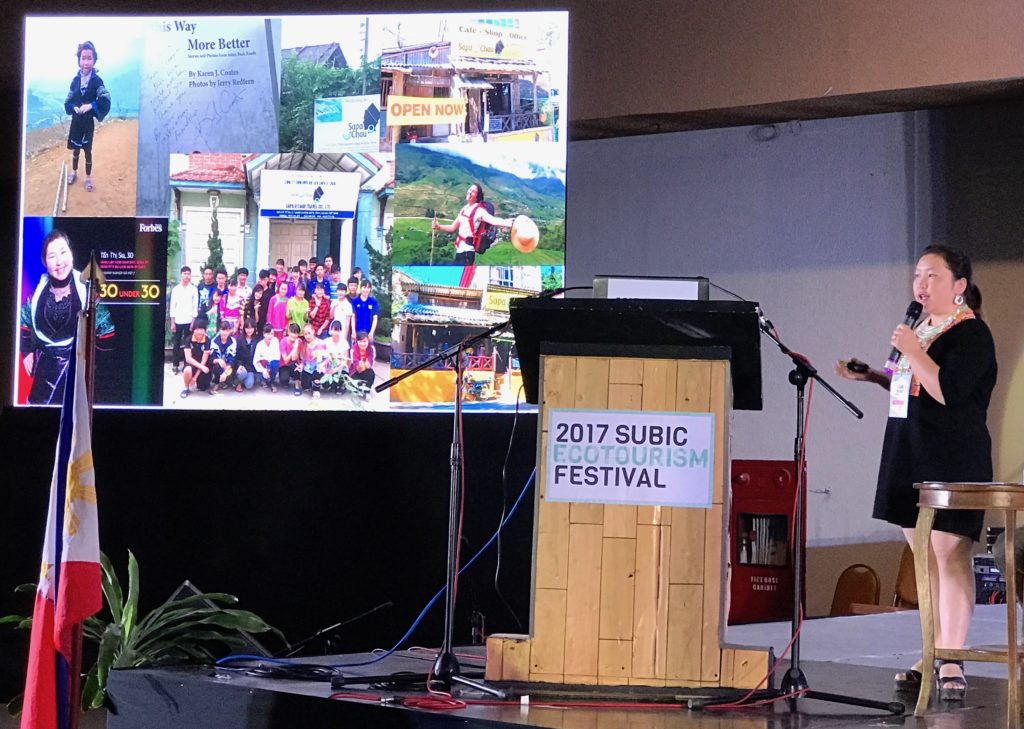
The Philippines is also unique in that its Department of Tourism has an Undersecretary for “Faith, Farm and Ecotourism”, probably the only country in the world with such a unique combination. The Undersecretary, Mr. Silvino Tejada said it was the government’s objective to develop ecotourism into a global standard as an engine of inclusive and sustainable growth. He hailed the potential for ecotourism as a catalyst for a climate resilient, robust and vibrant tourism industry in the Philippines. “I hope this festival will realise the targets,” he said.
The other speakers from Global Ecotourism Network (GEN) and Asian Ecotourism Network (AEN) included:
TONY CHARTERS (GEN VICE CHAIR), an environmental scientists and urban and regional planner by profession a founding director of Ecotourism Australia and Board member since 1999.
GLENN JAMPOL (GEN CHAIR), owner and developer of two 5-level sustainable hotels in Costa Rica: Finca Rosa Blanca Coffee Plantation Resort and Arenas Del Mar Beachfront and Nature Resort.
ROBERT HOLMES (GEN BOARD MEMBER), Founder & Chief Strategist of Green Living Project (GLP) Films, a content marketing agency dedicated to authentic storytelling and digital content strategy within the travel industry.
HITESH MEHTA (GEN BOARD MEMBER), a Landscape Architect, Architect, Interior Architect and Environmental Planner who has worked on socially and environmentally friendly projects in 63 countries.
MASARU TAKAYAMA, founded the Asian Ecotourism Network (AEN) in 2015. Owns and operates the ecotravel agency ‘Spirit of Japan Travel’ in Kyoto as well as a 75-year-old historic building registered under Japanese Culture Agency. Set up Japan Ecolodge Association (ECOLA) in 2006.
NABIL TARAZI who walked away from a 17-year career in the technology sector and adventure and ecotourism. He founded EcoHotels in May 2009, partnering with the Royal Society for the Conservation of Nature to operate the only ecolodge in Jordan, Feynan Ecolodge, selected by National Geographic Traveler as one of the best 25 ecolodges in the world.
ALBERT TEO (GEN BOARD MEMBER AND AEN VICE CHAIR), discussed his multi-award winning Borneo Eco Tours and Sukau Rainforest Lodge. He established the Borneo Ecotourism Solutions and Technologies (BEST Society) which garnered the UNWTO Ulysses Award for excellence and innovation in tourism in the NGO category.
Delegates also heard from Mr Greg Duffell, the former PATA CEO, on using the principles of Nature itself as guidelines of running an ecotourism business, Dr Kaewta Muangasame of Mahidol University, Thailand, on the brilliant wisdom of the late Thai King Bhumibhol’s Sufficiency Economy concept and Mr. Randy Durban, CEO of the Global Sustainable Tourism Council on the challenges of setting and maintaining ecotourism standards.
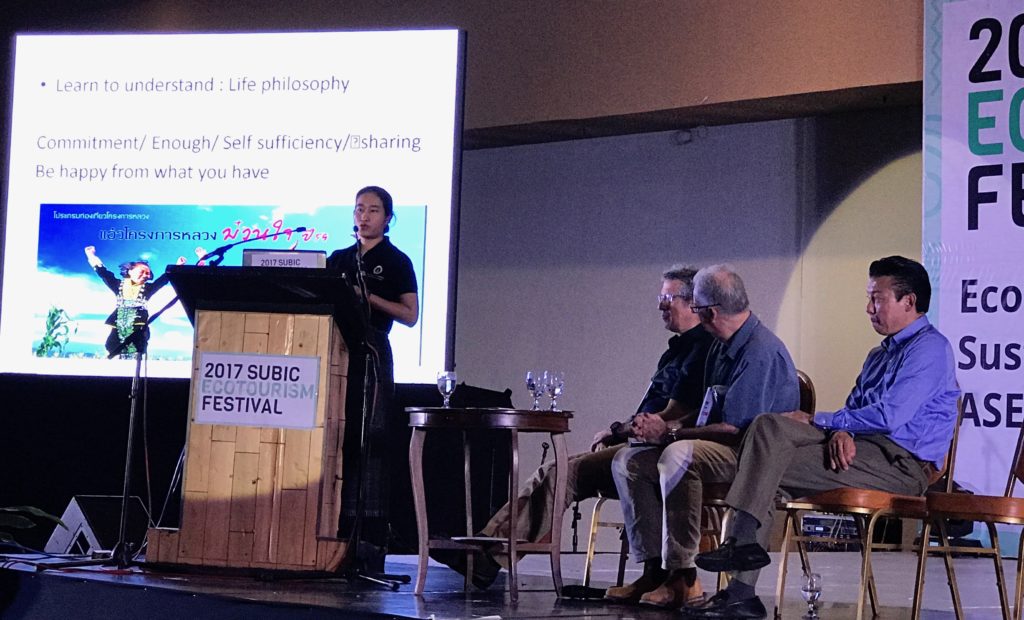
Dr Kaewta making her presentation. Seated in the panel are, from right, Mr Masaru Takayama, Mr Tony Charters and Mr Nabil Tarzi
The presentations by the foreign experts were matched idea for idea by the very eminent Filipinos themselves.
Marie Grace Pascua of the National Commission on Indigenous Peoples (NCIP), discussed highlights of the Indigenous Peoples Rights Act, a landmark social legislation passed in 1997 to protect the “Four Bundles of Rights” – to ancestral lands, self-governance and empowerment, social justice and human rights, and cultural integrity. The legislation paved the way for establishment of the NCIP to protect and promote the interest and well-being of indigenous peoples with due regard to their beliefs, customs, traditions and institutions.
One critical need is to highlight the importance of the indigenous peoples in correcting historical injustices. Ms Pascua said, “The cultures of those countries that have more economic power are likely to be more dominant than others, it is no surprise that global tourism threatens indigenous knowledge, social structures and relationships.”
Although tourism can be of great benefit, Ms Pascua cited NGO research showing that in many developing countries, tourism has harmed indigenous peoples by causing wide scale eviction from their lands, economic dislocation, breakdown of traditional values, degradation of cultural sites when historic sites and buildings demolished to make way for tourist facilities, and commodification of culture.
She said, “The environment is their spiritual space. We want tourism that is culturally appropriate, protects the customs and local belief systems. We want tourism projects that are transparent and do not themselves become source of conflict.”
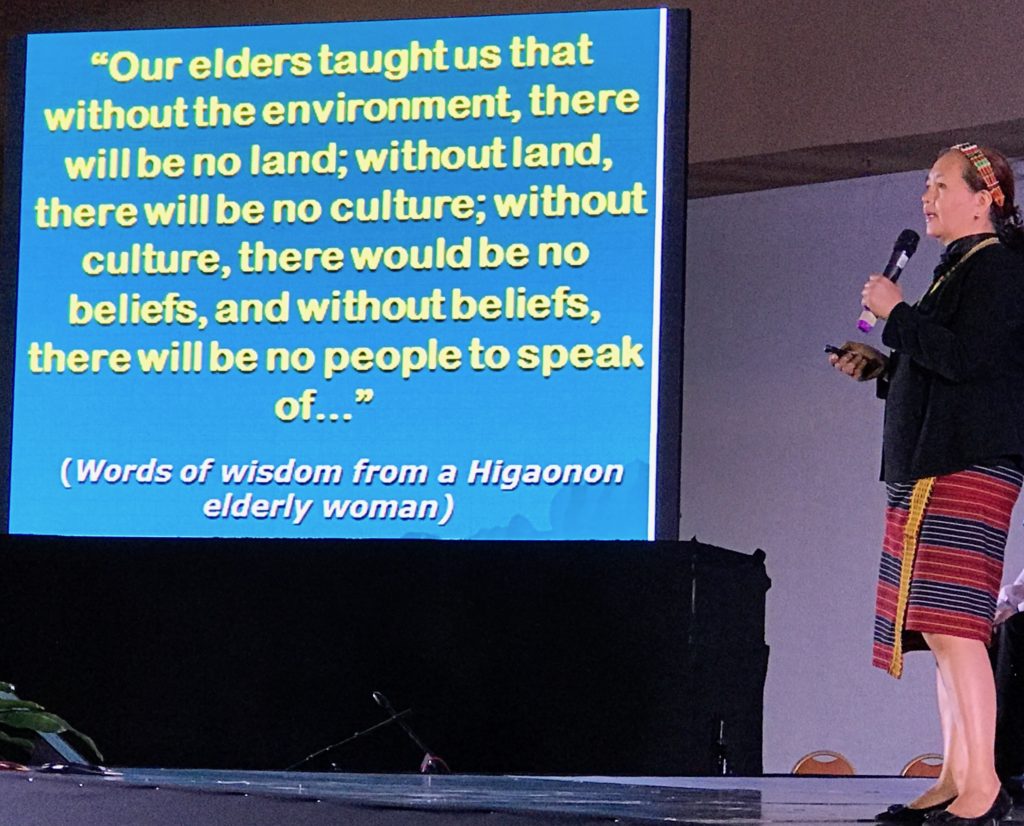
Marie Grace Pascua showing the slide with powerful words of indigenous wisdom.
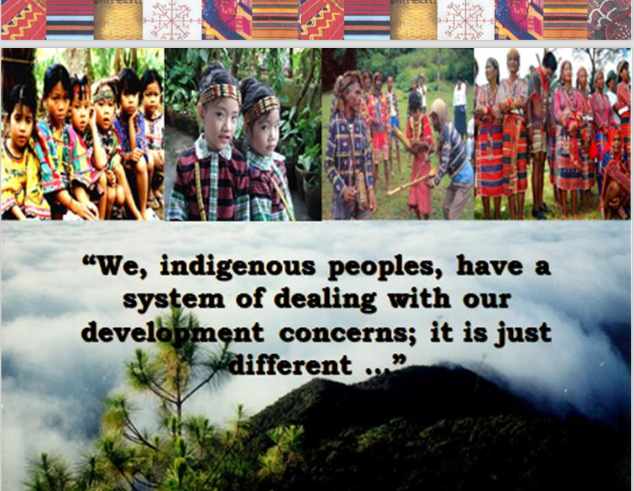
Another speaker was Rico Pableo, Executive Director of the School Of Living Traditions, a flagship project initiated by the Subcommission on Cultural Communities and Traditional Arts (SCCTA). Set up in 1993, the SLT is entrusted with safeguarding traditional culture and practices via transfer of indigenous knowledge and skills of art, craft and tradition from the cultural masters of a community. Young members of the community are the top priority, preferably out-of-school youth/young adults.
To help the learning centers become self-sufficient, the SLT center can be a Traditional Arts Heritage House, functioning as a non-profit, private organization to promote and exhibit the best works of traditional arts, sponsor lecture-demonstrations and market the products of SLT Culture Masters and their students locally and abroad.
He said that the first SLT was set up in Benguet province at the Benguet State University in 2002, specialising in (ankana-ey dances, songs and literature). Today there is at least one SLT in 9 of Benguet’s 13 municipalities, and 1 in Baguio City, and several SLTs all over the country.
The SLTs are not without their challenges, he said. Citing the case of the Ibaloi Performing Arts SLT in Lower Wangal, La Trinidad, he said that although under masters Nestor Epi (b. 1949) and Felix Taynan (b. 1964), its students are frequently sent off to regional and national events as representatives of their province. However, there is opposition from two fronts: Conservatives who label the SLT as a step in “returning to paganism”, and the Ibaloi elders who oppose the performance of certain music and dance outside of their ritual context.
One of the most practical sessions was by Australian International Funding Expert Paul Niederer. He narrated the process by which projects and ideas could use the internet-based platforms to raise crowd-funding.
Mr. Takayama, the founder of GEN and AEN, identified the following challenges ecotourism operators face in Asia:
• Establish stronger public-private relationships
• Make all types of tourism more sustainable
• Green washing / false claims
• Lack of reliable, evidence-based information
• On-the-ground exchange of experience
• Unclear legal information
• Human and financial resources
One trend that gained traction is the growing status of ecotourism as a spiritual experience. This editor was one of the invited speakers on the topic of “Can there be Sustainability without Spirituality?”. Arguably the first time such a thought-leadership topic had been raised at an Asian ecotourism conference, the talk highlighted the linkage between what is commonly known as “Nature” and the grassroots references to it in all the global religions and spiritual faiths as a source of peace, unity and harmony. Indeed, various speakers also referred to travellers who now seek a “communion with Nature” in the forests.
The grand finale was a surprise in more ways than one. In the 1960s and 70s, local indigenous people were deployed to train U.S. soldiers how to survive in the jungles of Viet Nam. After the war ended, these indigenous peoples were re-deployed to tourism. This year, Dr Mina Gabor recognised one of the trainers. Tata Kasui, 67, was presented with an Award and Certificate of Appreciation for his “lifetime work in preserving the Rain Forest and Culture”. Dr Gabor said it was the first time any such award had been given in the Philippines.
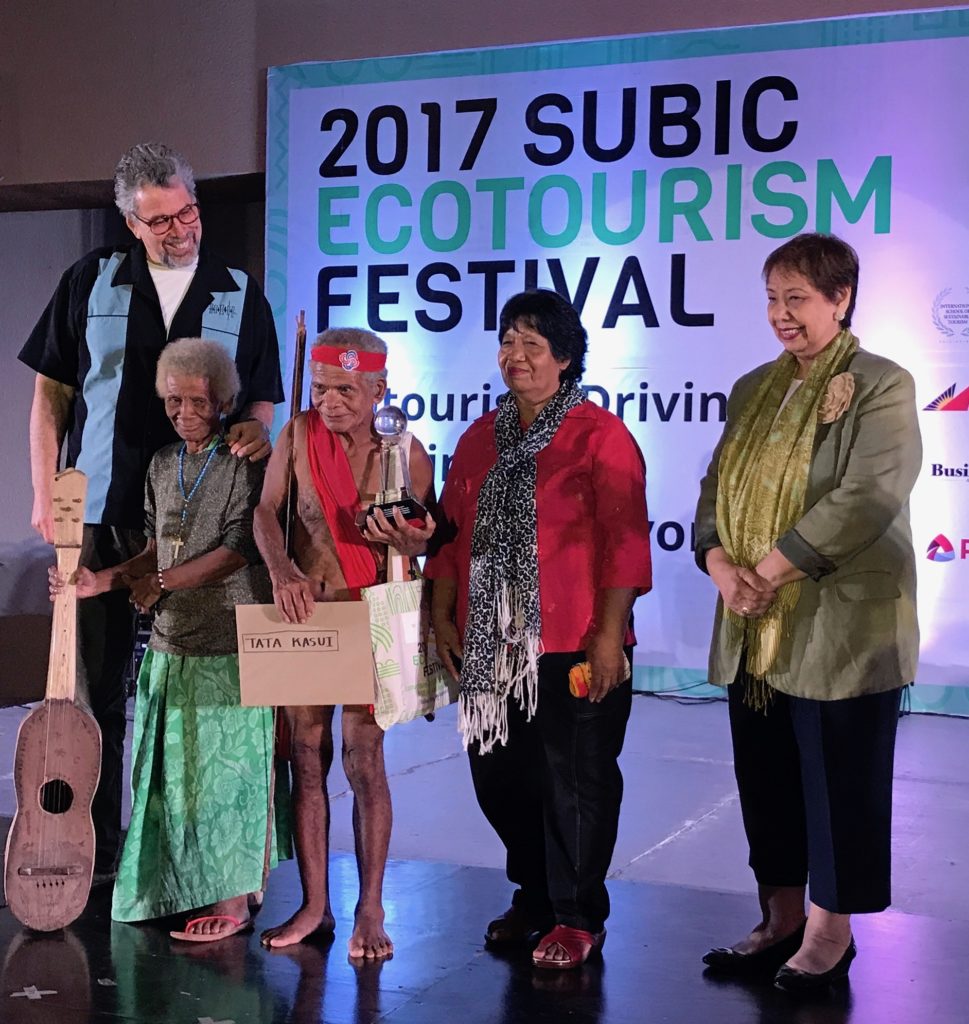
Tata Kasui (centre) with his award. He is flanked by wife (in red top) and his sister (with traditional guitar). At right is Dr Mina Gabor, and extreme left Mr Glenn Jampol.
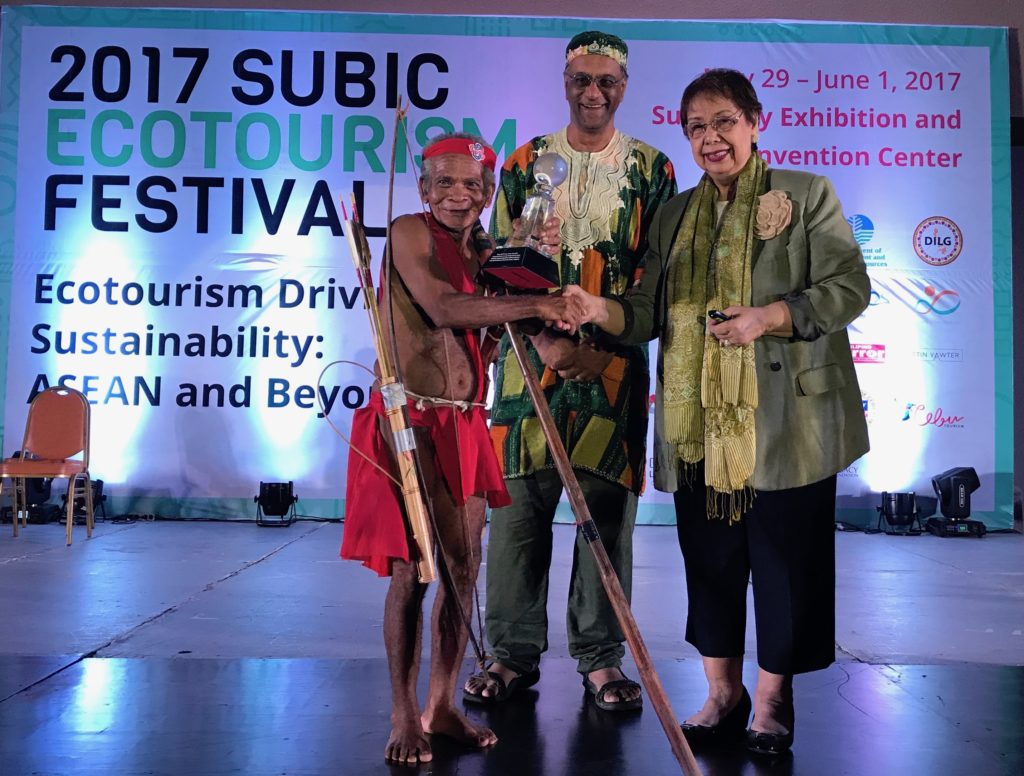
The award presentation with Mr Hitesh Mehta in the centre.
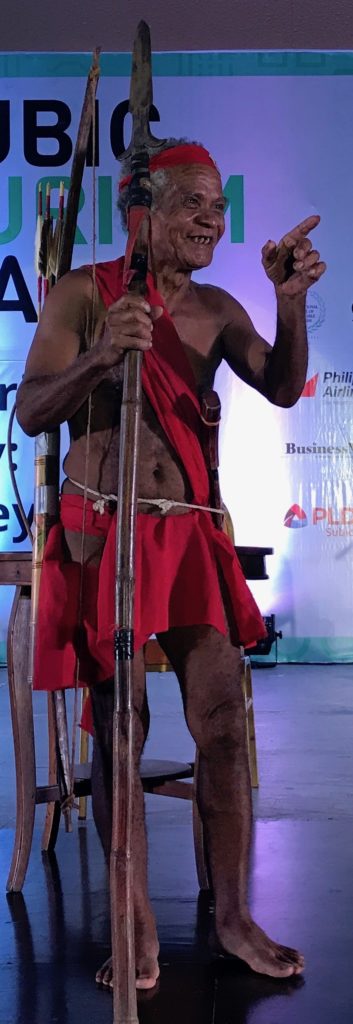
After the conference, delegates joined a trip to Green Canyon Resort where Jose Niccolo, 38, outlined how his family had turned a devastated former weapons testing ground of the U.S. military into an ecotourist resort, and how he himself, a wood-carving enthusiast, has enhanced the décor with some captivating works of art.
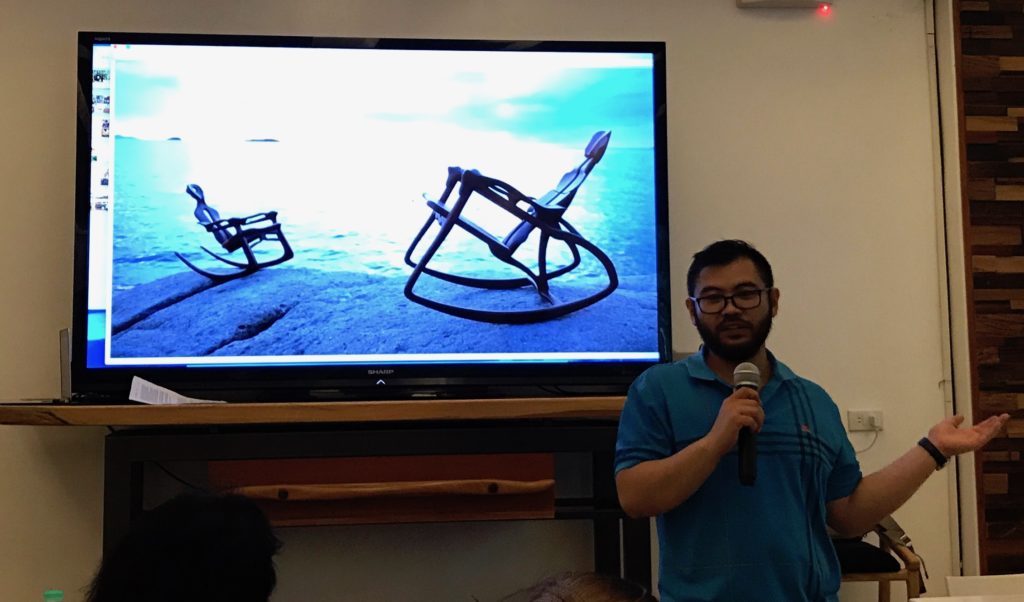
Jose Niccolo of Green Canyon Resort with samples of his woodwork art.
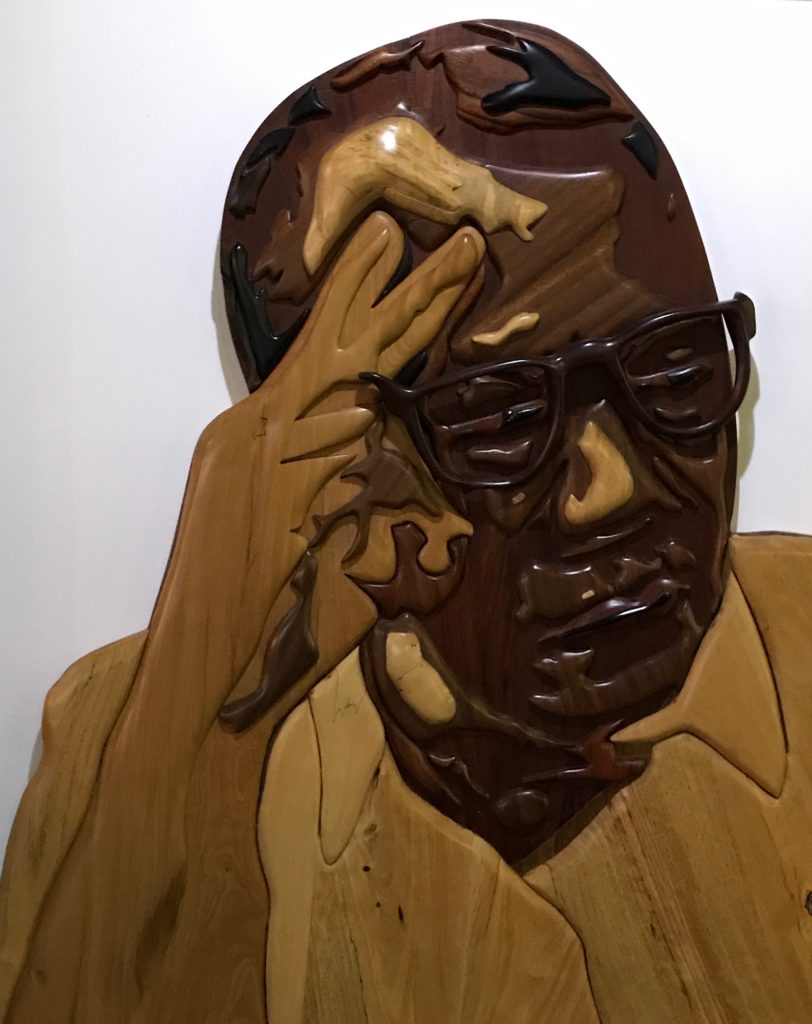
What next? Dr Gabor said she was extremely pleased with the turnout, the response and the quality of the discussions. She said she will now be writing to the various public and private sector representatives summarising the recommendations and key conclusions. She said some of the provincial administrators and tourism directors have expressed interest in organising similar events in their respective areas, but on a smaller scale.




Liked this article? Share it!